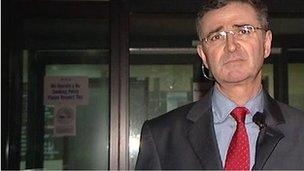Man dies as Belfast A&E 'pushed to limits'
- Published
The emergency department at Belfast's Royal Victoria Hospital has come under such pressure recently that the system has been "pushed to its limits", a health chief has said.
Dr Tony Stevens was speaking after an elderly patient apparently died unnoticed on a trolley in the A&E.
The Irish News, external said the man was discovered by ambulance staff who were to transfer him to another unit.
The trust said he was found unresponsive and died shortly after.
It is not clear how long the man has been on the trolley.
Belfast Health and Social Health Care trust has begun a full investigation.
The elderly man was brought to the Royal Victoria Hospital's emergency department by his family.
As there were no available beds at the Royal, staff arranged for him to be transferred to a ward in the City Hospital.
As he was not in a critical condition, a patient care crew was booked as opposed to paramedics who can deal with an emergency.
But when the ambulance crew arrived they found that the man had died.
When a person is admitted to A&E, staff are supposed to check a patient every 30 minutes including taking pulse and blood pressure.
Inquiry under way
The BBC understands a full investigation is now underway including inspecting hospital notes to see just how often this patient was monitored.
It is understood the death happened within the last few weeks.
Health Minister Edwin Poots said on Thursday: "There are concerns around this case, and I am keen to hear a full explanation from the Belfast Trust when it has concluded its investigations."
Trust Medical Director Dr Stevens said: "People do occasionally die. But nobody dies alone in an emergency department. Those are emotive words," he said.

Trust Medical Director Tony Stevens said a full investigation was under way
"I have no reason to believe a person died alone. What we are looking into is whether a particular patient received the level of care that is required."
Dr Stevens said the quality of care given by doctors and nurses was not a concern, nor was it about a problem with triage - where patients are seen initially for an assessment about the urgency of treatment needed. He said he was satisfied that a safe system was in place.
"We are focused on patients and we are delivering the best care," he said.
"But we came under sustained pressure last week which required our staff to work incredibly hard over a long period of time."
The trust director said it was focusing on getting people through A&E as quickly as possible and encouraging people who could get help from GPs not to come to the hospital.
"The key going forward is to ensure that we minimise the number of people who need to come to hospital," he said.
Director of the Royal College of Nursing NI Janice Smyth said fundamental reform of the health system in Northern Ireland was needed. She said too many people were turning up in hospitals because not enough services were available in the community.
She added that nursing staff's professional judgement was being compromised because of the volume of work they were being expected to get through.
Last November, Belfast City Hospital's Accident and Emergency Unit closed its doors and the Royal became the main hub of emergency care in Belfast.